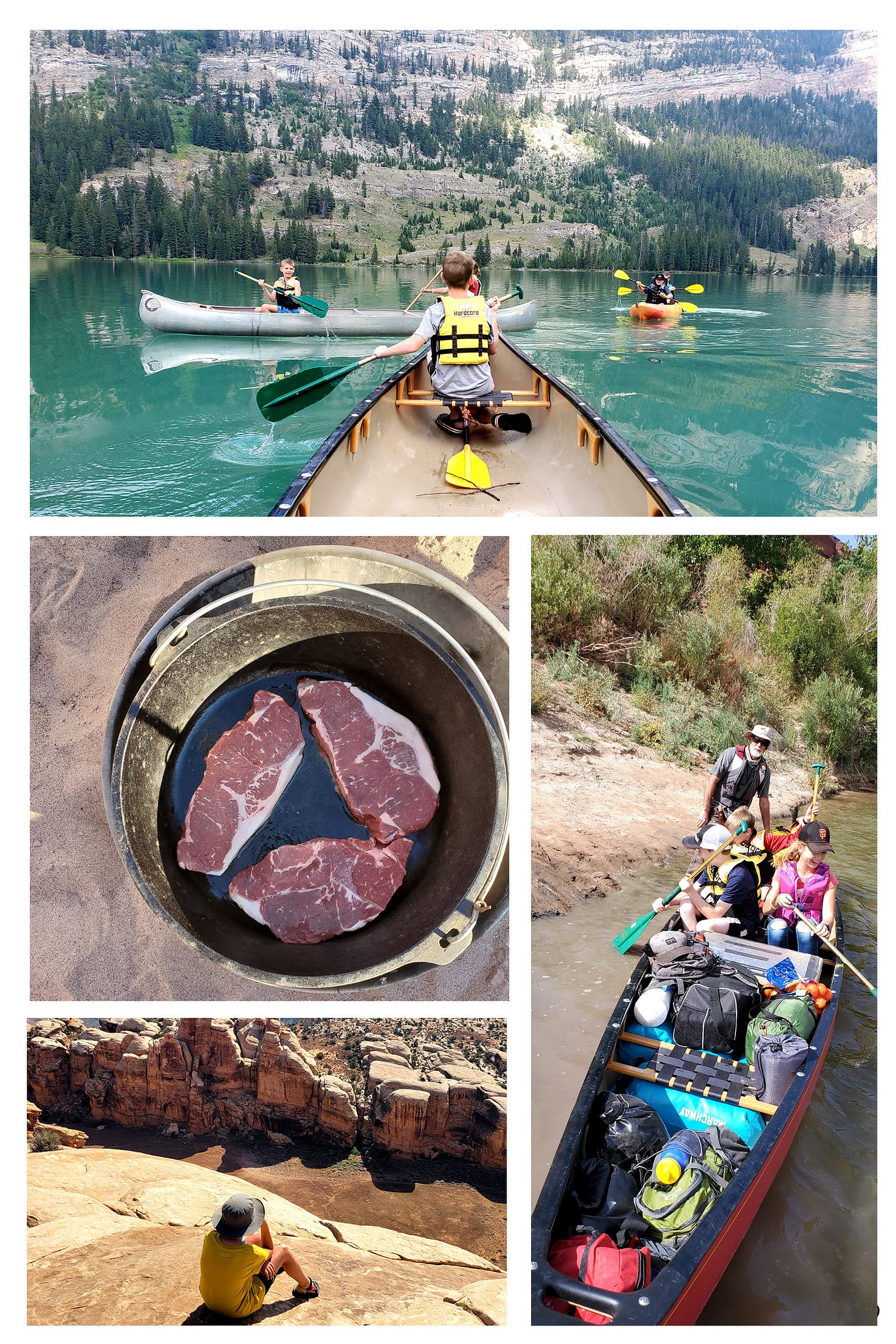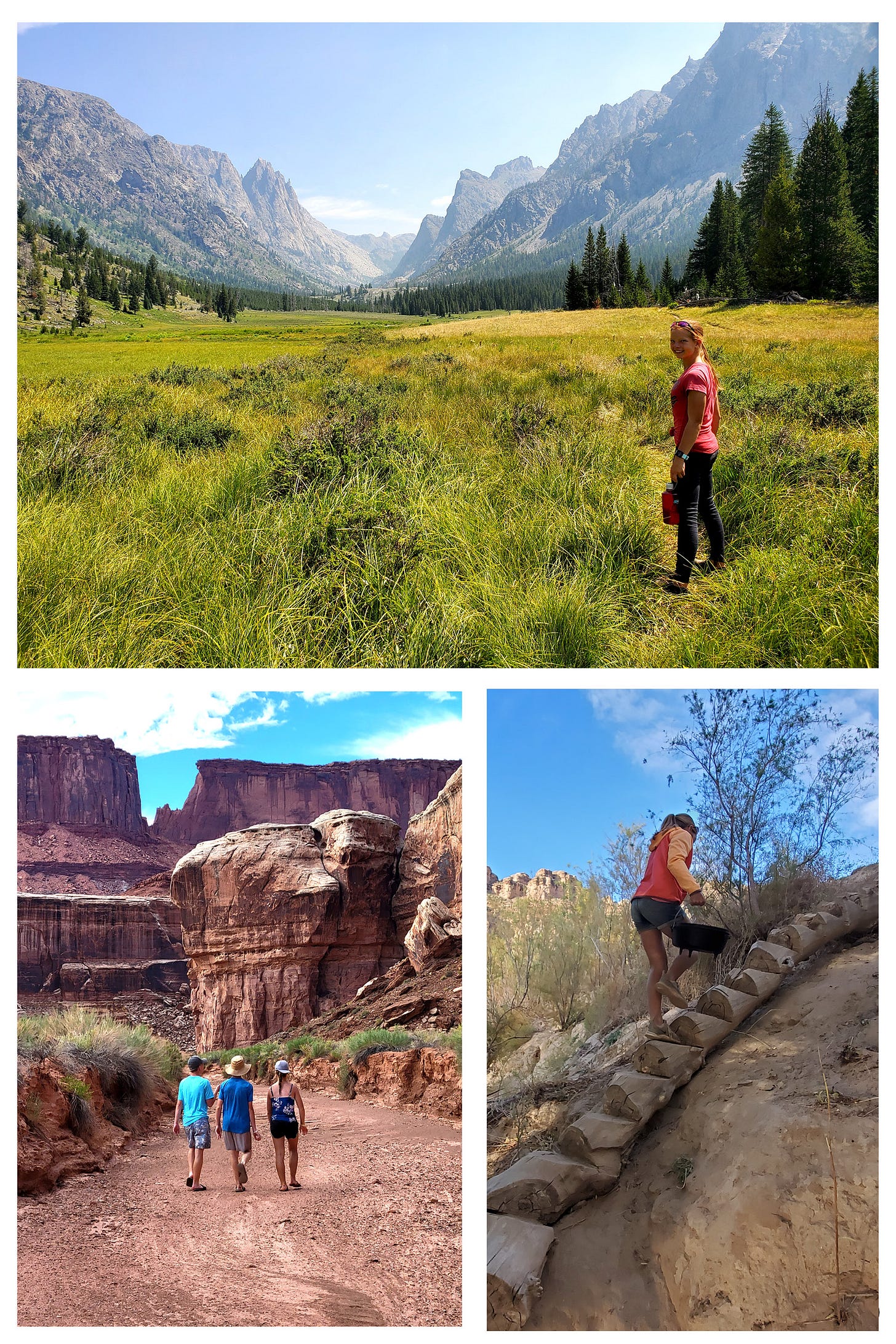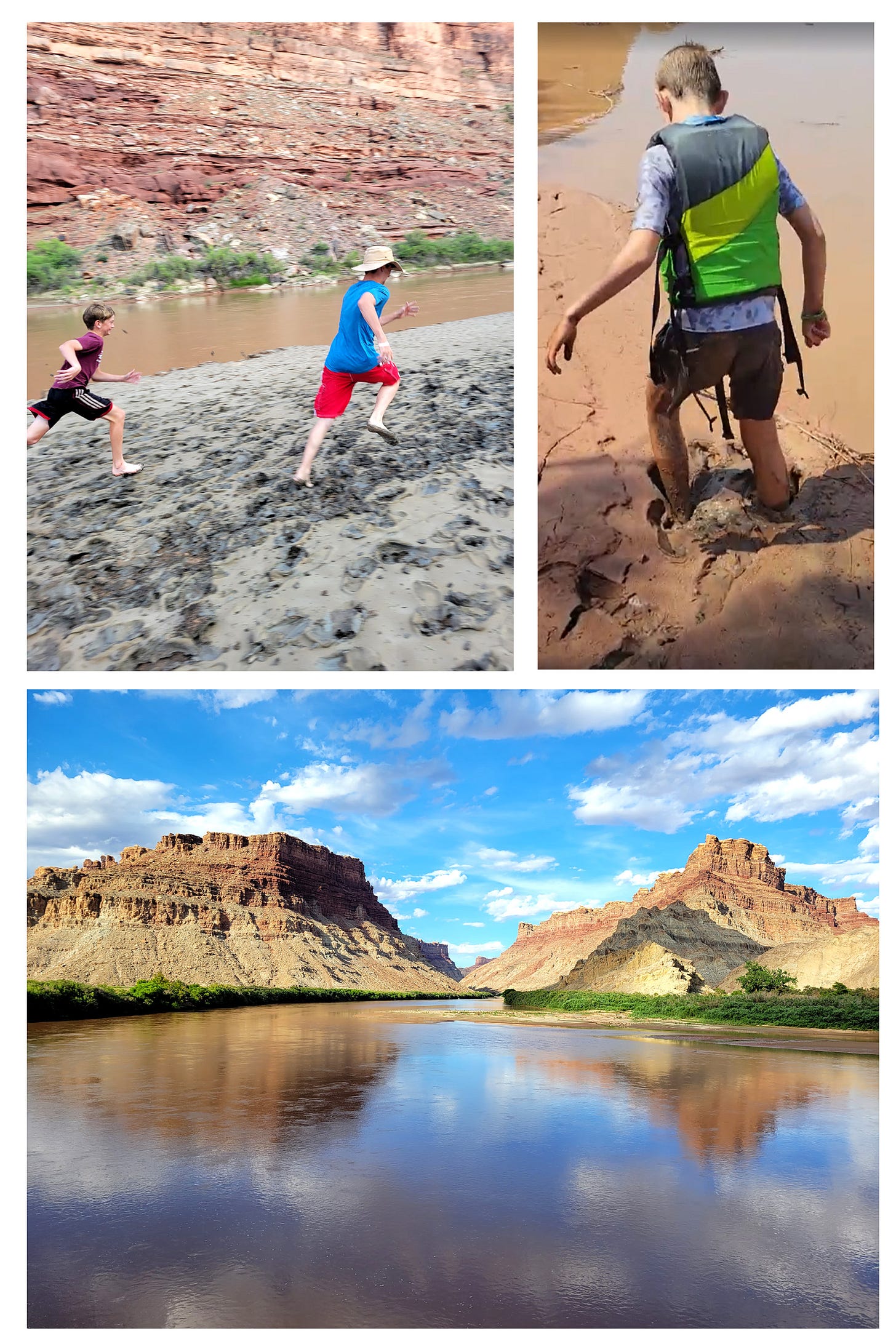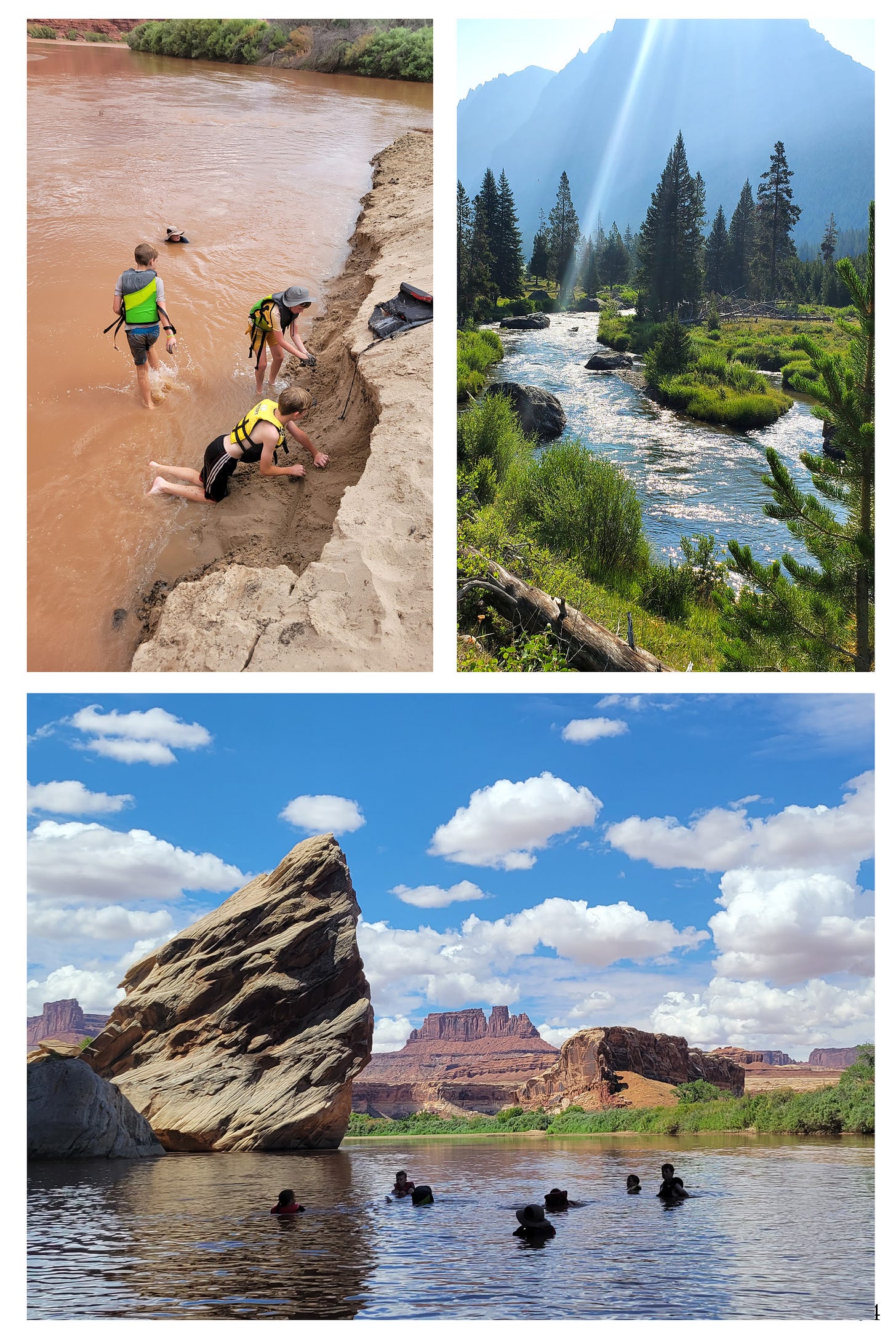When my youngest child’s enthusiasm for backpacking didn’t follow the same escalation as my older two children, I took a strategy from my own youth and decided to see if canoeing might better galvanize the seed of desire I hoped was simply latent in my then seven-year old. I grew up occasionally paddling the rivers of Missouri but had given up the habit now that I lived in the relative desert of Utah, but it turns out canoeing works as well here as it did there.
There is much about canoes to recommend. Canoes are inexpensive to rent or buy, learning to operate them is not difficult, they have an enormous carrying capacity, and if you float downriver (the way God intended it to be done) they move all by themselves. In addition to these luxuries they will bring you through some of the most beautiful and remote wilderness on earth and are more effective at putting distance between you and civilization than a Jeep, bested in this regard perhaps only by the laborious snowshoe. They create no pollution and the only engine noise is the stirring of river water with your paddle to the extent you choose to use it. While operating a canoe, your vitamin D levels tend to rise but if the sun gets too intense, consider hopping overboard and floating alongside the boat for a spell.
The only bad thing about taking up canoeing is that having experienced such sophistication you will immediately tire of most other forms of wilderness locomotion. Living like a king in the woods and having become aware of just how destitute you were as a backpacker you’ll no longer want any part of that miserable and (you now realize) embarrassing life. In an effort to keep backpacking alive you may be tempted down the even more foolish path of augmenting your on-foot expeditions with pack animals or, realizing that walking with your house on your back is a rather humiliating form of transport you may look into the efficacy of horse ownership. But it turns out horses require vast tracts of land for feed and storage unless you’re going to buy feed in which case your oldest child will likely need to find employment in a nearby factory to afford it. And even the best behaved horses are more prone to biting, kicking, and general disobedience than the cheapest canoes which never turn left when you ask to go right, get spooked, or return attitude to your love and affection. Canoes never get tired, thirsty, or hungry.
I’ll use my own boat (the SS Templeton, named by the kids after the rat in Charlotte’s Web) to illustrate the kind of opulence canoes are capable of delivering. I own a single 20 foot (admittedly larger than average) canoe which is capable of transporting my entire family of five people, tent, sleeping bags, toilet, personal backpacks, tackle box, fishing poles, camping chairs, two-burner stove, fuel, dutch oven, charcoal, fire pan, small library, large food box and - this is key - our 45 quart cooler stocked with steaks, pork chops, ground beef, sausage, cheese, cream, grapes, biscuit dough and yogurt - capable of keeping food cold for seven days. Contrast that with the dehydrated fare backpacking peasants must resort to. In our most recent expedition, due to the high level of silt in the river we, at the very last minute, also added four five-gallon jugs of water to the list of stowed equipment. (This last-minute addition pales in comparison to Henry David Thoreau’s story of unexpectedly adding a moose hide to their smaller boat carrying three passengers when his Indian guide just couldn’t stand to leave it with the moose.) And no matter how much gear you load in, your boat will still float unaided at the speed of the river which means efficiency increases the more you carry1. All of this can be managed down the river with a single oar wielded by the rear oarsman with other passengers contributing to extra velocity to the extent it pleases them to do so.
What’s more, the canoe rehabilitates walking too, enabling it to blossom in its proper sphere without being exploited by overuse or under undue loads. A mid-day scamper up a shaded canyon tributary to a waterfall unencumbered by a bundle of literally everything you need to survive on your back is an expression of freedom rather than enslavement.
But perhaps the biggest dimension canoeing adds relative to its alternatives is the energy that attends embarking in a vessel. One is not inclined to name his backpack like he would his boat or slap its side in a spirit of comradery. Unlike boats, backpacks are not privileged with the assignment of pronouns. This is probably because unlike the vessel which protects its owner, facilitates his locomotion, and responds to his will, the backpack sits inertly depending for its movement exclusively on the effort of the one whom it allegedly serves. On the river, one does quite a bit of living aboard his vessel, aided by her in his capacity for receiving the grace that abounds around him as he passes through. The passenger may put down his oar a moment and enjoy a piece of cheese or a bit of dried beef while chatting with the ravens perched in the cliffs all while continuing to move rather than enjoying his surroundings intermittently and mostly during stops to rest when it becomes possible to remove the weight upon his back.
There is no equivalent in backpacking to pushing off from shore. There is no launch, no waving goodbye to the car or to the lone shade tree that attended the loading of the boats as you anticipate where the river might take you (trails don’t take you anywhere, you have to doggedly pursue them). Fridtjof Nansen was nothing without The Fram nor Neil Armstrong without Apollo 11. The coziness of the ship imbues a sense of mission, of status, of anticipation and of power.
From the foundation provided by the craft, land expeditions can be readily staged and supported. Camps can include the comforts of hammocks, chairs, awnings, toilet and well-equipped kitchen and hikes can be executed with nothing in tow but a bottle of water hanging from your belt on one side and a knife on the other knowing capacity will soon be refreshed at the base camp supported by the boats. Depending on the landscape, one may go a whole week without wearing shoes. Have you ever tried fishing while hiking? It doesn’t work very well.
A handful of canoes can not only support an entire clan but they will also allow young children and older family members who are incapable of long hikes to participate in major wilderness expeditions enabling villages of cousins, grandparents, aunts and uncles to sprout on sandbars or wooded peninsulas complete without the corruption of motors and with all aspects of civilized society: gourmet food, the best books, firelit philosophical discussion, music – and unlike civilization all of this is achieved while allowing the children free roam of the wild environment they were meant to grow up in.
And thus we see that when taken seriously, the reluctance of children may become a force to refine and redirect parental ambition in superior ways. If not for my son’s distaste for backpacking, I would have never rediscovered the sublimeness of canoeing. This in fact is an effect of children in general. A child forces a parent to resolve contradictions between what the child prefers now, and what experiences will best ensure their future tranquility - two things which are very often at odds. Forced through the lens of my child’s personality, I am forced to refine, revise, and re-implement whatever wisdom I have to convey and in the process discover new things.
I don’t mean to say that a trip down the river is nothing but effortless floating, although there is a lot of that. There is work to be done, but each chore - paddling, loading boats, unloading boats, building a fire, cooking a steak, erecting a tent, brushing your teeth, administering first aid, filtering water, inflating an air mattress, washing the dishes, stowing a sleeping bag, preparing a fishing rod, washing out a canoe - proceeds without reluctance because urgent chores with immediate payoff are easy to perform. Procrastination is only tempting when things can be reasonably procrastinated. I find it immensely easier to build a powerpoint presentation during the hour just before the meeting than a week in advance (not advocating this strategy, just saying it requires less motivation).
Primitive living reduces the separation between work and play - a divide which technology magnifies by specializing work and inventing useless play. Life on the river is a tightly woven sequence of productivity and play, each encouraging transition to the other and occasionally becoming one. Is roasting wieners while recounting the day’s events work or play? Work is provoked by the dynamics of the day which remain unmuted in the wilderness. The sun drives us out of our sleeping bags when it rises, sends us leaping into the river at its peak, and has us digging out sweaters and building fires when it sets. Cooking and eating is driven by hunger rather than by boredom. In fact, without recourse to technology, the wilderness rehabilitates boredom too which is solved by exploring, napping, playing cards, or making progress down the river. Work becomes a reaction to the immediate demands of body and environment rather than a wholly premeditated affair executed by disciplined will.
The extra demands placed upon the living organism in the wild are complemented with more generous opportunity. Action is demanded but options for action are multiplied. Each beach offers unique possibilities for the evening ahead. Unpacking boats inevitably transforms into unexpected activities - kids finding a stretch of mud to hold foot races on, a steep sand bank that needs excavating, a boulder that needs climbing, a bullfrog that (from a 10-year-olds perspective) needs companionship, or a cliff from which to leap into the water. New technology creates novel, but initially narrow avenues to explore, which extract us from environments wherein we have broader connection. The canoe, a more mature invention, allows greater connections with the earth rather than fewer. In some ways my options for the evening are broader on a sandbar with a canoe than in my home office with internet access and car in the garage. Deep calmness, intense peace, rich tranquility, while being mostly off the menu in my house, can be achieved as easily as paddling my empty canoe out onto the lake after dinner and considering the forest against the sound of my paddle. Lowering and holding my paddle on one side, the boat gently spins, silently bringing camp into view where I see my tribe around the fire and I am reminded of how Thoreau put it. I cease to live and begin to be.
The truth of this of course depends on the extent to which you paddle. Weight obviously impacts paddle thrust. Which is to say, the less you paddle the more efficient you become.








